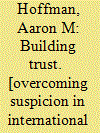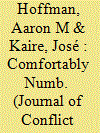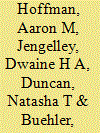|
|
|
Sort Order |
|
|
|
Items / Page
|
|
|
|
|
|
|
| Srl | Item |
| 1 |
ID:
068050


|
|
|
|
|
| Publication |
New York, State University of New York press, 2006.
|
| Description |
xiii, 213p.
|
| Series |
SUNY series in global politics
|
| Standard Number |
0791466353
|
|
|
|
|
|
|
|
|
|
|
|
Copies: C:1/I:0,R:0,Q:0
Circulation
| Accession# | Call# | Current Location | Status | Policy | Location |
| 050935 | 327.17/HOF 050935 | Main | On Shelf | General | |
|
|
|
|
| 2 |
ID:
175335


|
|
|
|
|
| Summary/Abstract |
Exposure to a single report about terrorism in the mass media can trigger a range of emotional and political reactions. The consequences of exposure to several terrorism reports in row, however, are a matter of controversy. We examine the effects of prolonged terrorism coverage using an experimental design that combines self-report measures of emotions and political attitudes with instantaneous biometric data on emotions. Consistent with research on nonassociational learning, we find that exposure to multiple videos habituates people to depictions of terrorism: the longer people watch terrorism coverage, the less intense their reactions are to the images of terrorism they see. Some images and videos, however, contribute to this result more than others. This suggests that the ultimate effects of terrorism coverage depend on the interplay between the quantity and quality of reporting, not the quantity alone.
|
|
|
|
|
|
|
|
|
|
|
|
|
|
|
|
| 3 |
ID:
099658


|
|
|
|
|
| Publication |
2010.
|
| Summary/Abstract |
Observers argue that the business of news is responsible for worsening the coverage of terrorism, but exactly how economic considerations influence coverage is controversial. Based on an analysis of over 1600 articles from The Washington Post and USA Today, we find that concerns about the effects of economic pressures on terrorism reporting are exaggerated. The business climate affects coverage, but the long-term impact of market pressures on coverage is modest. Articles about terrorist violence are increasingly prominent, but coverage of counterterrorism remains robust. Efforts to inoculate the press against the worst excesses of the market are unnecessary.
|
|
|
|
|
|
|
|
|
|
|
|
|
|
|
|
| 4 |
ID:
137111


|
|
|
|
|
| Summary/Abstract |
Using experiments, we show that subjects who are asked about their support for war without being told about diplomatic strategies to deal with crises back military operations at levels consistent with people who are told that the alternatives to war are of low quality. In contrast, subjects who are told that diplomacy could work to resolve conflicts express less support for military operations. These results suggest that, in the absence of conflicting evidence, people premise their support for war on the assumption that leaders use force as a last resort. Implications for the study of success as an influence on public attitudes about US military operations are considered.
|
|
|
|
|
|
|
|
|
|
|
|
|
|
|
|
| 5 |
ID:
078140


|
|
|
| 6 |
ID:
100397


|
|
|
|
|
| Publication |
2010.
|
| Summary/Abstract |
Terrorism is designed to draw attention to particular issues and causes. Yet, the incidence of credit-taking (announcing one's responsibility for acts of terror) varies even though anonymity can undermine the clarity of the intended messages. This article offers an explanation of the variation in credit-taking that emphasizes how the competitive context in which groups operate shapes terrorists groups' need to cultivate support for their activities. Increasing numbers of terrorist organizations make it difficult for the supporters of terrorism to reward the perpetrators of particular attacks with their backing. Since such support is critical to the proper functioning of terrorist organizations, groups use claims of responsibility to distinguish themselves from those that had no hand in the violence. Consequently, variation in the probability of credit-taking fluctuates as a function of the number of active terrorist groups in a given theater of operations. This argument is contrasted with theories that suggest credit-taking is influenced by: the ideological mix of terrorist organizations; the willingness of governments to respond to terrorism using military force; state sponsorship; the depth of communal grievances; and the use of suicide attacks. The results, based on an analysis of transnational terrorism events conducted in the Israeli theater of operations between 1968 and 2004, suggest that competitive context is a consistently strong predictor of credit-taking. By implication, the results point to the utility of counter-terrorism strategies that interfere with the transmission of information between terrorist organizations and their supporters.
|
|
|
|
|
|
|
|
|
|
|
|
|
|
|
|
|
|
|
|
|